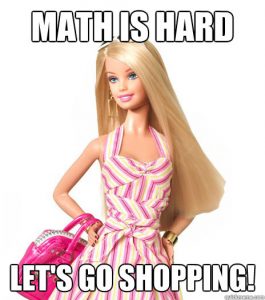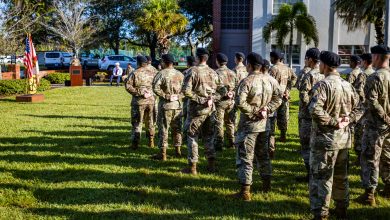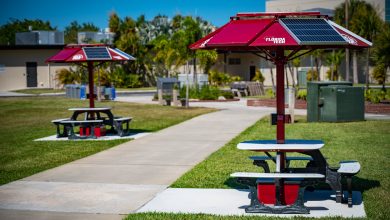“I think we need to show young girls and women the real faces of technology and science.”
Recent electrical engineering graduate Jessica Vidmark has two loves in life: the color pink and helping people. She was part of the winning team for Best in Show in Electrical Engineering at the 2016 Northrop Grumman Engineering & Science Student Design Showcase for their enhanced knee brace.
Vidmark is currently pursuing her masters degree in biomedical engineering from Florida Tech.
Tell us a little bit about yourself?
Ever since I was a little girl, I have always been interested in mathematics—in first grade, I used to ask my dad to give me multiplications and divisions on a piece of paper to solve for fun. As I grew older, I found great interest in learning how to apply math on physics and electronics, which lead me to choosing a bachelors degree in Electrical Engineering. A big dream of mine is to contribute to the problem solving, design, and engineering of a new technology that would help improve the daily lives of many people, which is why I am now taking a slight turn into a masters degree in Biomedical Engineering. I hope a degree in biomed will give me the chance to apply my knowledge in electronics onto new products that can help people everywhere. As my senior design project, I worked with three classmates to create an enhanced knee brace designed to assist users in the rehabilitation process. The device was developed to both help the user regain range of motion and increase muscle strength, and ended up winning Best in Show in Electrical Engineering at FIT’s student design showcase. This was a really proud moment for me, because it made me confident that I can actually make a difference. I loved how this project evolved into something that could really be of help to many, and I wish to continue my future career on a similar path.
What inspired you to pursue a STEM education and career?
As I mentioned, I have always known math was one of my strong suits, and learning to apply that on real-world problems in physics class and circuits really pulled me in. It was first when I got onto the biomedical path, however, that I felt a real passion for what I was doing, because I get to use my knowledge, ideas, and imagination to help people and give back to society. What started as a will to simply do my best has now evolved into a desire to make a difference in our world, in the best way I possibly can. With a STEM degree, I feel like I have the best platform to take off from, with the background knowledge, experience and ability to go on and do big things.
What do think are some of the most shared/common challenges women in STEM fields encounter?
Although gender equality has improved in recent years, there is still a massive gap between men and women in our society, and the STEM field is no exception. It saddens me how I still have to read articles about the gender wage gap, and about how supervisors rate proposals differently if the author is said to be a man vs. a woman. With this bias against us even before we enter the job market, us women have a lot to prove. I think the best we can do is stand up for equality, and in the meantime use this inequality as extra motivation to prove that we can do just as much as any man, if not more.
How have you overcome obstacles/challenges as a woman in STEM?
I often felt that I needed to prove myself more because I was a woman in a degree that is male-dominated. However, instead of letting this bring me down, it became an extra motivational push to me; a reason to try even harder to show that I don’t need to follow the norms or be limited to do only what people expect of me. The more that people were surprised by my choice of career path or my success, the harder I wanted to try to push my limits. It is quite the kick to show people that you can do more than what they expected of you!
Knowing what you know now, what advice you would give your younger self?
Don’t listen to people who try to tell you what to do. Don’t let anyone tell you that something is too difficult for you—you and only you know your own limits. Take advice, but always follow your own arrow.
What one takeaway would you want to impart on a young woman thinking of pursuing an education/career in STEM?
Picture yourself when you’re older. What would you like to be doing? Who would you like to be, if you had full power of your future? Well, the exciting thing is that you DO. Right now, you are in the enviable position where you can be whoever you want to be, and do whatever you want to do. All you need to do is take the path that leads you there! And the path you choose is entirely up to you.
What is an aspect of being a woman in STEM you were surprised to discover?
I was surprised to note how welcomed I felt into my engineering department. Although women are a minority in the STEM degrees, the faculty does a great job showing how greatly they value us, and encouraging us to go out and be role models for the younger generations.
In your experience, what are the top things leaders could do to encourage more young women to enter STEM fields?
 I am a girly girl, and always have been. I love pink, dresses, and princesses, and when I was younger my birthday wish lists always consisted of dozens of new Barbie dolls I so desperately wanted to add to my collection. I remember when I was in 6th grade, my teacher told my parents that she thought I should be a scientist. At the time, I hated that comment. I could not think of anything duller than those scientists I pictured in boring white robes and goggles, just dripping things into beakers all day. Now, I would love to end up with a job where I get to do research and develop new technology that the world has never seen before. I think we need to show young girls and women the real faces of technology and science. There are so many inspirational women out there, and we need to make sure that young girls know more than just the stereotypes. If we show them the many different faces of women in STEM, all girls—tomboys to little princesses—will be able to picture themselves as scientists, technicians, engineers, mathematicians, or whoever they may wish to be.
I am a girly girl, and always have been. I love pink, dresses, and princesses, and when I was younger my birthday wish lists always consisted of dozens of new Barbie dolls I so desperately wanted to add to my collection. I remember when I was in 6th grade, my teacher told my parents that she thought I should be a scientist. At the time, I hated that comment. I could not think of anything duller than those scientists I pictured in boring white robes and goggles, just dripping things into beakers all day. Now, I would love to end up with a job where I get to do research and develop new technology that the world has never seen before. I think we need to show young girls and women the real faces of technology and science. There are so many inspirational women out there, and we need to make sure that young girls know more than just the stereotypes. If we show them the many different faces of women in STEM, all girls—tomboys to little princesses—will be able to picture themselves as scientists, technicians, engineers, mathematicians, or whoever they may wish to be.





